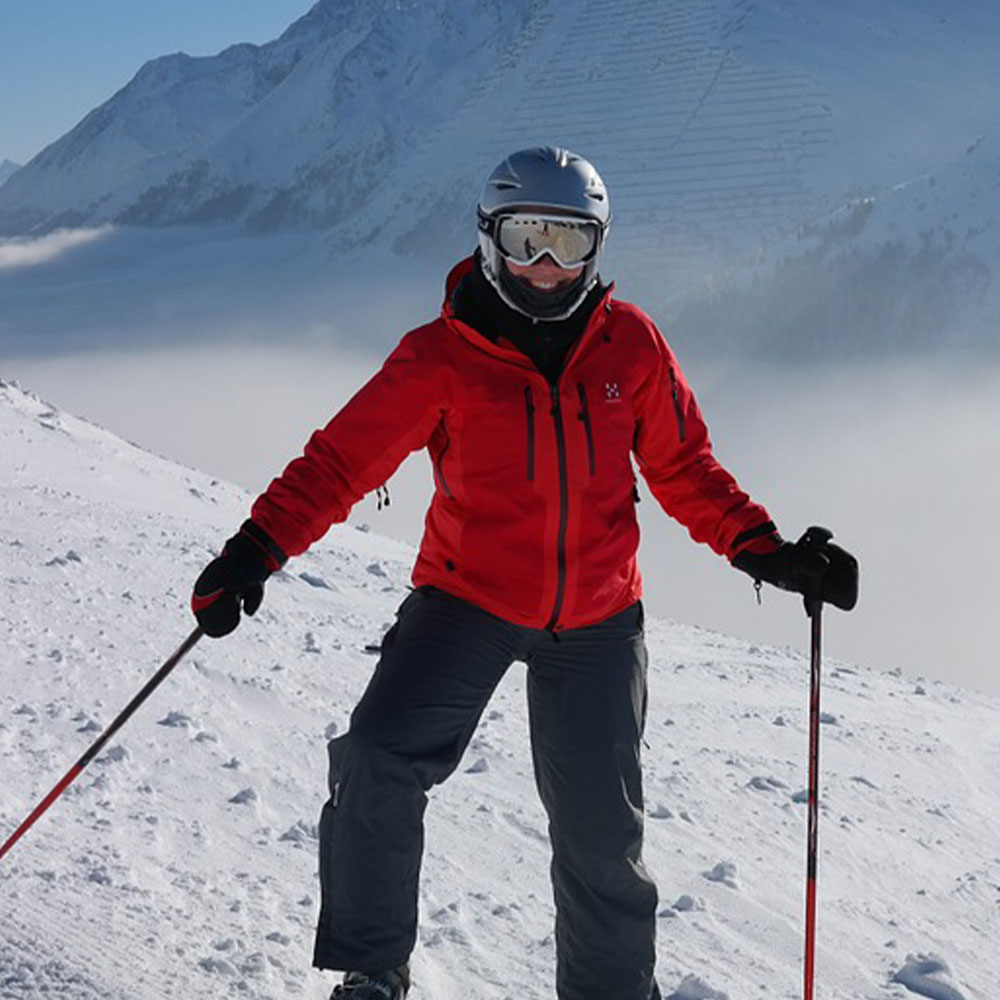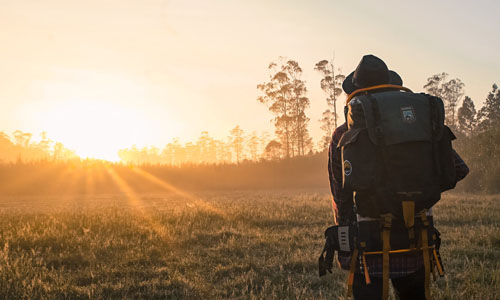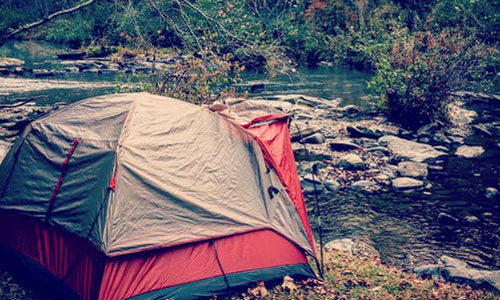Things Every Beginner Must Know about Camping in the Wild
Author

A keen runner, skier and nuts about cycling. Karl lives in Cumbria, where he loves encouraging his two children to follow in his outdoor lifestyle. Whilst out and about keeping active, Karl keeps a diary and shares it with Outdoor Look.
Camping in the wild is becoming a popular activity with each passing day. The idea of spending a few nights in the wild without urban necessities is becoming a new trend. If you are an experienced camper, then you won’t find it difficult to plan a weekend in the wild. But people with no practical experience of camping get all confused on how to plan a perfect getaway in the lap of nature. So, we have brought the list of basic things to know for a beginner camper to have a great camping experience.
Pack Lightweight Stuff and Small Tent
Packing lightweight stuff in your backpack will help you in easy movement and won't weigh down on you while finding a camping spot. Low weight will also ensure that you leave less impact on the environment. Pack a small tent, a sleeping mat, water and food, a stove with fuel, a torchlight, map, and waterproof clothing. A small tent will help you blend in easily with the landscape and is easy to setup. You can also try hammock camping with a waterproof cover to keep you safe from the elements.

Know the Local Laws and Safety Rules
Before you head out for your first camping trip you must know the laws. Not all places are legal for camping and you should know the places where authorities allow the setup of a camp. Most of the national parks will let you camp for one or two nights, only if you stay away from local houses and roads. You must also leave no trace of your stay and follow all the safety regulations. You should inform your family or friends about your camping site and your duration of stay. You must carry a GPS device and a physical ordnance survey map of your camping location. Always keep a first aid safety kit and a torch with spare batteries for use in case of an emergency.
Practice at Home and Start Simple
You do not want to lose your precious time in learning how to use essential camping equipment at the campsite or wasting time setting up a tent. Practice using all the essential camping equipment at home and also learn how to set up a tent. You might have dreamt about having a multi-day hiking trip with your camping. But for a beginner, starting slow and simple is the ideal thing to do. Do not choose an area which is quite remote or has an unpredictable weather pattern
Pick the Right Spot and Leave No Trace
Pick a dry and flat ground with some shelter from blowing winds. You must avoid camping in farmland or places which seem like in use for some other activity as it may lead to a legal action against you. The best practice is to arrive later than twilight and leave early before the sunrise. This will ensure that you leave little to no trace of your presence in the environment. Avoid lighting campfires as it may damage the groud if the fire gets out of control. Do all the cooking on your stove and pack waste to take back from campsite.

Start with simple and easy to access places. Learn how to set up a tent and get a feel of spending the night in the wild. You should also avoid areas with tough terrains where picking the right way is tedious. Once you have some experience in camping, you can think about going on that dream multi-day camping trip. So this was everything to know about camping for beginners. Hope you have a wonderful experience in the wild.
Author

A keen runner, skier and nuts about cycling. Karl lives in Cumbria, where he loves encouraging his two children to follow in his outdoor lifestyle. Whilst out and about keeping active, Karl keeps a diary and shares it with Outdoor Look.
Categories
- Sport (28)
- Product Reviews (3)
- Team Outdoor Look (7)
- Mike Wild (2)
- Mike Payton (2)
- Suse Hammond-Pears (3)
- Snowboarding (12)
- Latest Offers (105)
- Shop Talk (1)
- Competitions (7)
- Walking (413)
- Lifestyle Fashion (8)
- Travel (86)
- Kit Guides (176)
- Workwear Clothing (6)
- Safety Workwear (4)
- Health/Fitness (289)
- Skiing (91)
- Great Outdoors (1316)
- Cycling (92)
- January 2025
- December 2024
- November 2024
- October 2024
- September 2024
- August 2024
- July 2024
- June 2024
- May 2024
- April 2024
- March 2024
- February 2024
- January 2024
- December 2023
- November 2023
- October 2023
- September 2023
- August 2023
- July 2023
- June 2023
- May 2023
- April 2023
- March 2023
- February 2023
- January 2023
- December 2022
- November 2022
- October 2022
- September 2022
- August 2022
- July 2022
- June 2022
- May 2022
- April 2022
- March 2022
- February 2022
- January 2022
- December 2021
- November 2021
- October 2021
- September 2021
- August 2021
- July 2021
- June 2021
- May 2021
- April 2021
- March 2021
- February 2021
- January 2021
- December 2020
- November 2020
- October 2020
- September 2020
- August 2020
- July 2020
- June 2020
- May 2020
- April 2020
- March 2020
- February 2020
- January 2020
- December 2019
- November 2019
- October 2019
- September 2019
- August 2019
- July 2019
- June 2019
- May 2019
- April 2019
- March 2019
- February 2019
- January 2019
- December 2018
- November 2018
- October 2018
- September 2018
- August 2018
- July 2018
- June 2018
- May 2018
- April 2018
- March 2018
- February 2018
- January 2018
- December 2017
- November 2017
- October 2017
- September 2017
- August 2017
- July 2017
- June 2017
- May 2017
- April 2017
- March 2017
- February 2017
- January 2017
- December 2016
- November 2016
- October 2016
- September 2016
- August 2016
- July 2016
- June 2016
- May 2016
- April 2016
- March 2016
- February 2016
- January 2016
- December 2015
- November 2015
- October 2015
- September 2015
- August 2015
- July 2015
- June 2015
- May 2015
- April 2015
- March 2015
- February 2015
- January 2015
- December 2014
- November 2014
- October 2014
- September 2014
- August 2014
- July 2014
- June 2014
- May 2014
- April 2014
- March 2014
- February 2014
- January 2014
- December 2013
- November 2013
- October 2013
- September 2013
- August 2013
- July 2013
- June 2013
- May 2013
- April 2013
- March 2013
- February 2013
- January 2013
- December 2012
- November 2012
- October 2012
- September 2012
- August 2012
- July 2012
- June 2012
- May 2012
- April 2012
- March 2012
- February 2012
- January 2012
- December 2011
- November 2011
- October 2011
- September 2011
- August 2011
- May 2010
- April 2010
- March 2010
- February 2010
- January 2010
- November 2009
- October 2009
- September 2009
Submit a Comment